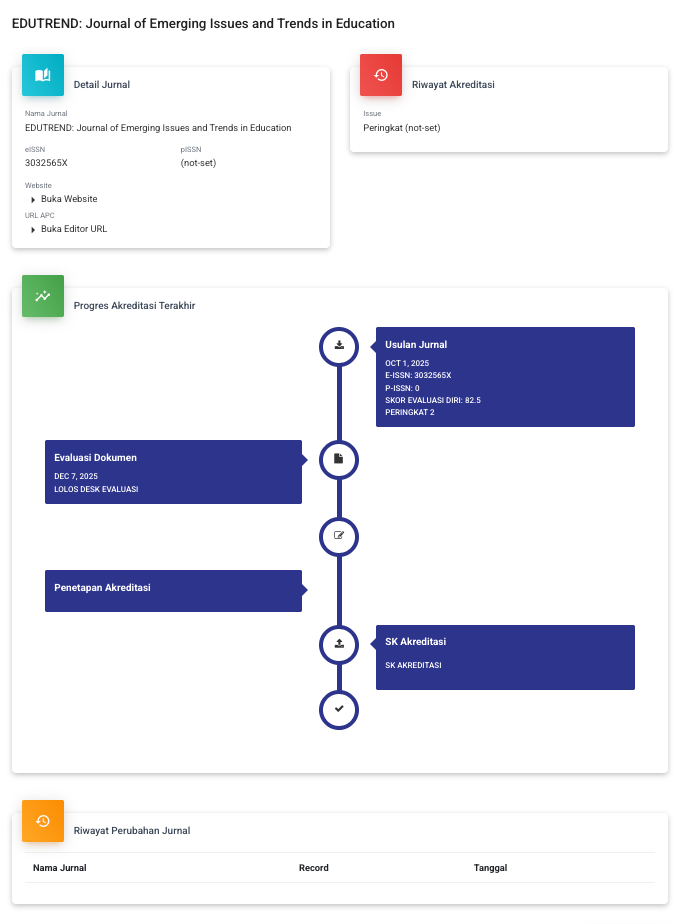Utilizing the Demonstration Method to Enhance Science Learning Outcomes
A Classroom Action Research at SDN Kebagusan 02 Pagi, South Jakarta
DOI:
https://doi.org/10.59110/edutrend.279Keywords:
Action Research, Demonstration Method, Learning OutcomesAbstract
This classroom research is motivated by the learning outcomes of third grade students at SDN Kebagusan 02 which still need to be improved. The purpose of this study was to improve student learning outcomes in science subjects on the material of changes in the properties of objects at SDN Kebagusan 02 Pagi. This research method, using a class action method with a cycle system while the learning model is a demonstration method where the teacher demonstrates or shows something in front of students, which is done inside or outside the classroom. The results of this study are that the pre-cycle or completeness meets the KKM 24.42%, in cycle I completeness 64.28% meets the KKM, and in cycle II it meets the KKM 100%. Based on the results of observations, it can be concluded that the demonstration method learning model of science subjects’ changes in objects in class III. As for other data related to research and student work results as in the appendix. Finally, the researcher suggests to all teachers to be creative in presenting learning, especially in using props and media that are interesting and varied so that they can bring students in a pleasant learning process and complete student learning outcomes can be achieved.
References
Amrane-Cooper, L., Baume, D., Brown, S., Hatzipanagos, S., Powell, P., Sherman, P., & Tait, A. (2023). Online and distance education for a connected world. UCL Press.
Ashikuzzaman (2021). Digital information literacy [LIS Edu Network]. Retrieved from https://www.lisedunetwork.com/digital-information-literacy/#google_vignette
Bates, T. (2015). Teaching in a digital age: Guidelines for designing teaching and learning. BCcampus Open Education. https://opentextbc.ca/teachinginadigitalage/
Bin Herzallah, M. (2021). E-Learning at the University of Algiers Reality and challenges. Journal of Distance Learning and Open Learning, 9(16), 73-91. doi: 10.21608/jdlol.2021.168484
Boyd, D. (2011). “Dear Voyeur, Meet Flâneur… Sincerely, Social Media.” Surveillance & Society 8 (4) (March 24): 505–507.
EU Institute for Digital Technology (EIT Digital). (2022). The future of education for digital skills. [Report]
Guemide, B., & Benachaiba, C. (2012). Exploiting ICT and e-learning in teacher's professional development in Algeria: The case of English secondary school teachers. Turkish Online Journal of Distance Education, 13(3), 41-49.
Littlejohn, A., Beetham, H., & McGill, L. (2012). Learning at the digital frontier: a review of digital literacies in theory and practice. Journal of Computer Assisted Learning, 28: 547-556. https://doi.org/10.1111/j.1365-2729.2011.00474.x
Loan-Vergara, S., & Acrelius, H. (2020). The digital literacy gap and its impact on student success in online learning environments: A systematic review. International Journal of Distance Education, 19(2), 1-22. [invalid URL removed]
Mehdaoui, A., & Benabed, A. (2022). Gauging Algerian EFL Teachers’ Awareness of the 21st Century Compulsory Skills: Case of EFL Teachers at IbnKhaldoun University of Tiaret. Technium Social Sciences Journal, 33(1), 115–131. https://doi.org/10.47577/tssj.v33i1.6917
Parker, S. (2020). The future of higher education in a disruptive world. Melbourne, KPMG.
Rasli A, Tee M, Lai YL, Tiu ZC and Soon EH (2022). Post-COVID-19 strategies for higher education institutions in dealing with unknown and uncertainties. Front. Educ. 7:992063. doi: 10.3389/feduc.2022.992063
Sarnou D. (2020). Questioning The Significance of Technologizing Algerian Schools And Universities: Did It Fail Or Succeed? International Journal on Integrating Technology in Education (IJITE), Vol.9(No.1,).
Sarnou D. (2022). A Freirian Deconstruction Of Online Education In Algeria. Cadernos Cimeac, v. 12(n. 3), 66–77. https://doi.org/10.18554/cimeac.v12i3.6632
Smith, E. E., & Storrs, H. (2023). Undergraduate digital literacies and social media survey (version 1.0) [Data set]. Borealis. [CrossRef].
Weller, M. (2011). A pedagogy of abundance. Spanish Journal of Pedagogy, 249, 223–236.
Downloads
Published
How to Cite
Issue
Section
License
Copyright (c) 2024 Cecep Maman Hermawan, Hesti, Lalita Shafa Anjani, Syifa Fitri Fuadah Fuadah, Irfan Abdul Gani, Okta Rosfiani

This work is licensed under a Creative Commons Attribution-ShareAlike 4.0 International License.
















 the Creative Commons Attribution-ShareAlike 4.0 International License |
the Creative Commons Attribution-ShareAlike 4.0 International License | 